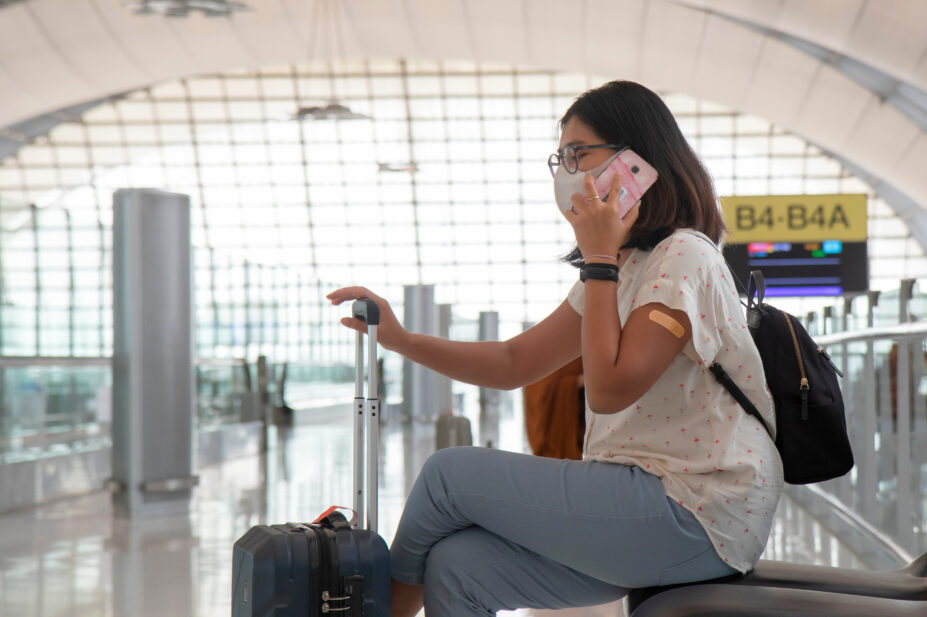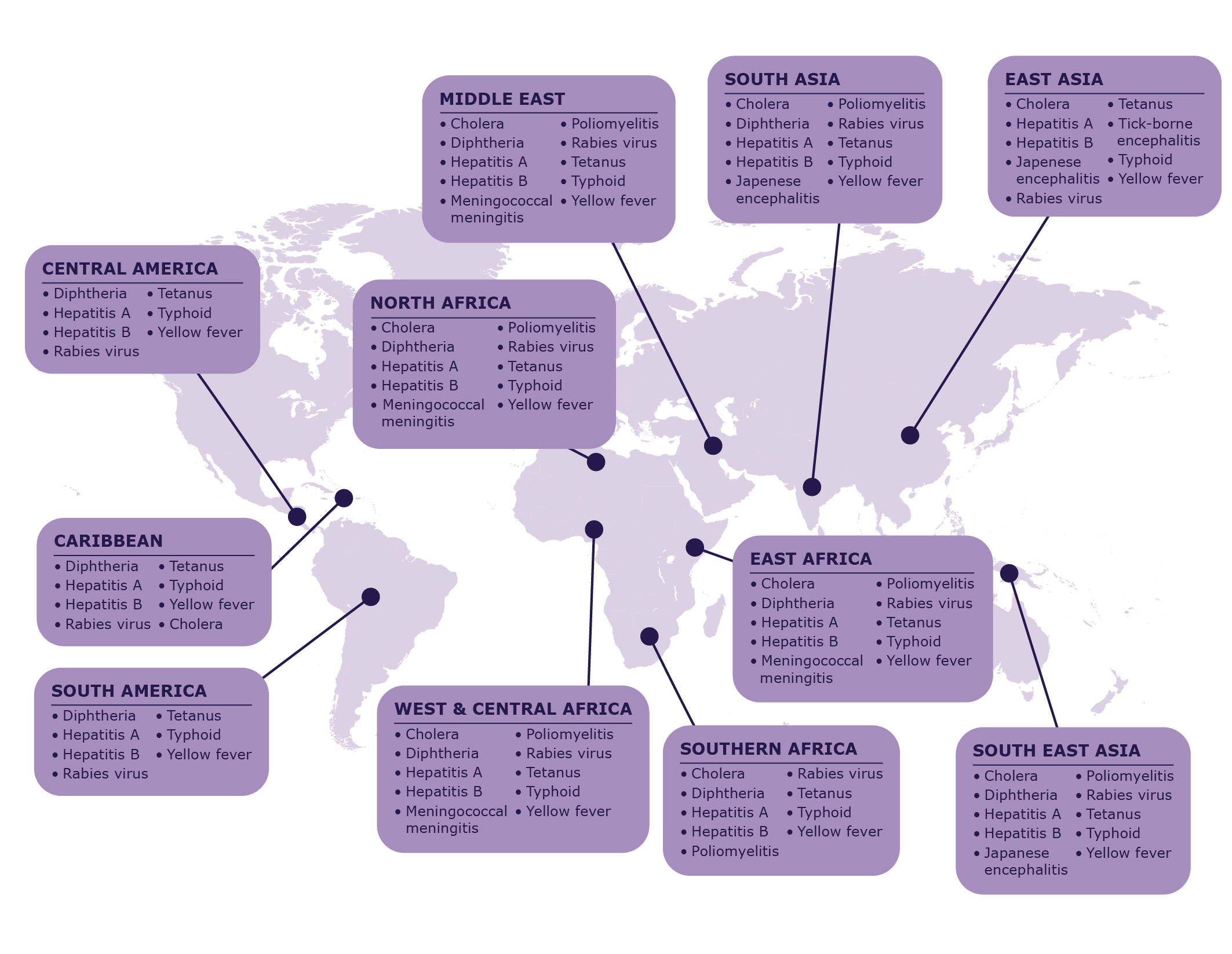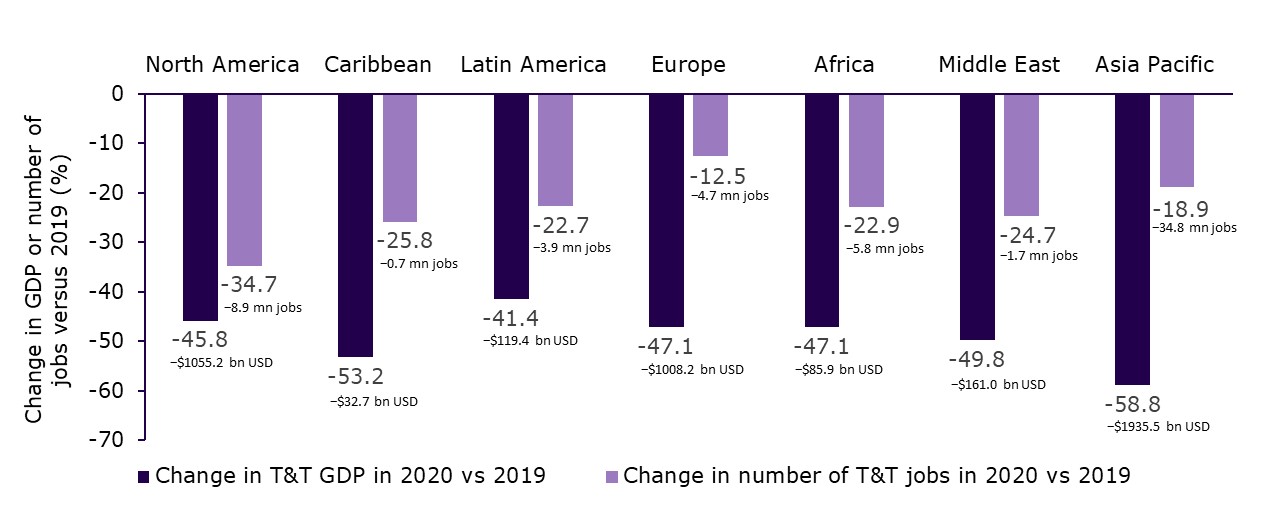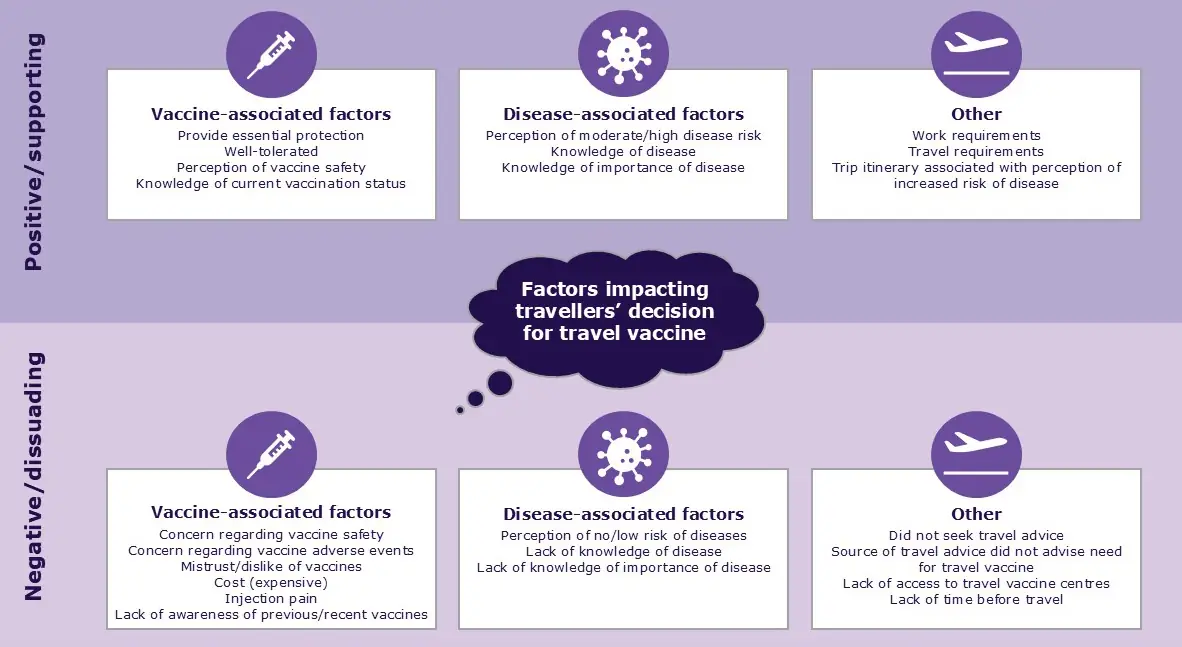
Shutterstock.com
Introduction
In the UK and Ireland, we often think of countries with endemic infectious diseases as far-away locations. This perception can lead us to believe that we are protected from diseases by a physical barrier. Nowadays, however, we can access these countries with greater ease, and the apparent barrier between us and diseases has become even more insignificant.
This ’shrinking world’ was starkly demonstrated by the COVID-19 pandemic. Despite global efforts to contain the disease—travel restrictions, periods of lockdown, and isolation—the SARS-CoV-2 virus rapidly spread across the globe. With the world now returned to pre-pandemic levels of tourism, what lessons can we learn about infectious disease management?
The many travel vaccines which are readily available allow people to access countries whilst protecting themselves and others against infectious diseases. Post-COVID, the importance of vaccination against infectious diseases to improve the population general health has become even clearer. Alarmingly, research shows that not everyone who travels internationally receives the advised vaccinations1. We face a unique opportunity to increase awareness of travel-related diseases and improve the uptake of vaccinations. This will allow us to continue safe, responsible movement throughout our globalised society.
In this white paper, we aim to address the question: “What is the relationship between international travel and travel vaccines?”. To do this, we will consider:
- What are travel vaccines?
- The economic benefits of tourism to countries with vaccine-preventable disease
- The relationship between travel vaccines and international travel in the post-COVID world.
1. What are travel vaccines?
The NHS’s routine vaccination schedule protects the population against several diseases but does not cover all the infectious diseases found overseas2. Nowadays, we travel internationally much more, and so we are more likely to encounter serious infections that are not common at home3. The risk of becoming ill when travelling to low- and middle-income countries is estimated to be between 47% and 79%4,5. This risk varies depending on the infectious disease, destination and length of stay, as well as the general hygiene of travel conditions and traveller’s general health3,6.
Of course, it is not only the traveller who may become ill. The COVID-19 pandemic showed just how easily diseases can spread, even without travelling. It is, therefore, important to raise awareness of the individual responsibility to reduce the risk of catching an infectious disease as it may spread further and cause disease outbreaks when returning to the home country.
Travel vaccines are highly effective at protecting from illness and stopping the spread of some infectious diseases, including cholera, diphtheria, hepatitis A and B, rabies, tetanus, tuberculosis, typhoid and yellow fever6. Up-to-date travel advice may be sought from the World Health Organization6, and, in the UK, from the NHS website2,7. It is important to personalise the plan based on traveller’s vaccination history and general health, travel destination and the time remaining before departure6.
Common vaccines for international travellers are shown in Figure 1. Travel vaccines are advised when travelling to some countries to protect us from travel-related illnesses but may not be a requirement for entry into the country6. For other countries, it is required to show proof of travel vaccination (e.g., for yellow fever) before being even allowed to enter or exit the country6.

2. The economic benefits of tourism to countries with vaccine-preventable disease
Countries with endemic infectious diseases are often far-away locations from the UK and used to be largely inaccessible. However, long-haul air travel has revolutionised international travel. In 2018, there were around 1.4 billion international arrivals by tourists globally4,8. International travellers and tourists spent US$1.8 trillion worldwide in 20199. Clearly, this is a major boost to developing countries, as tourism is often very important for their economies10.
There have been several notable disease outbreaks in recent decades, including the 2003 severe acute respiratory syndrome (SARS) outbreak and the 2015 Middle East respiratory syndrome (MERS) outbreak. The tourism sector survived both outbreaks without a long-term decline in global tourism11. However, travel restrictions in 2020 due to COVID-1911 heavily affected the travel and tourism industry12, which suffered a loss of almost US$4.9 trillion (a 50.4% decline) and 62 million jobs (a 18.6% decline) from 2019 (Figure 2)9.

Nowadays, many people are rethinking their approach to international travel and are more aware of serious travel-related infections13,14. Travel vaccines may, therefore, play a crucial role in sustaining tourism and economic welfare in developing countries by allowing people to travel safely and responsibly to countries with endemic infectious diseases15,16. Recent research showed that vaccination against COVID-19 increased the probability of people taking a holiday trip17.
3. The relationship between travel vaccines and international travel in the post-COVID world
How many people travel without travel vaccines?
Data show that many travellers receive their travel vaccinations and are safely protected from travel-related illness during their journey18–24.
There are many reasons why travellers showed a positive attitude towards receiving travel vaccinations — these are summarised in the top half of Figure 3. Research shows that many people agree on the benefits of travel vaccines in helping them to stay healthy — across four studies, 74–92% of travellers agreed that travel vaccines provided essential protection from travel illness18,19,22,25. For other people, travelling with work, or the need to obtain proof of travel vaccinations, often reminds them to receive their travel vaccinations22,24. During the COVID-19 pandemic, the need to provide proof of COVID‑19 vaccination when travelling put a focus on travel vaccines. Research during the pandemic also showed that people who wanted to travel more had a higher intention to get vaccinated against COVID-1916.

Despite this, not all travellers — and sometimes only a minority — receive their travel vaccinations18,19,22,25. Not receiving travel vaccines leaves people at risk of serious illness and further spread of diseases during their journey and when they return home, thus potentially exposing the most vulnerable to the risk of contracting the disease and developing more severe complications. These results raise the question: why do people travel without appropriate vaccination and risk their own health and the health of others?
Why do some people travel without appropriate vaccination?
There are many reasons why people choose to travel without travel vaccinations– these are summarised in the bottom half of Figure 3. These reasons include concerns about the safety of travel vaccines, a lack of knowledge about travel-related diseases, a perception that there is a low risk of infection, cost, fear of needles, and an overall negative attitude towards vaccines18–20,24,26–28.
Vaccine safety has highlighted an important concern for many travellers, despite travel vaccines having been shown to be generally well tolerated. A conversation on the risk/benefits of vaccination would support travellers to make an informed decision24. Even when vaccines aren’t required for travel, a travel health risk assessment is still recommended for children and older people, pregnant women, and for those who have a weakened immune system or long-term conditions that need medications29. Travellers should be advised to plan ahead and consult their GP or a private travel clinic 4–8 weeks before departure2,6. This will allow sufficient time to complete the vaccination schedules and develop immunity2,6. Even in cases when the trip is imminent, it is not too late to provide pre-travel advice and possibly administer some vaccinations6.
Summary
Nowadays, travel is more commonplace than ever. For developing countries, this comes as a major boost, as tourism is often vital for their economies. However, as the world becomes a smaller place, the risk of endemic infectious diseases spreading globally is ever more apparent. As COVID-19 showed, this risk of disease spread is present and travel may be a crucial element to facilitate it.
Following the COVID-19 pandemic, many people are rethinking their approach to international travel. Travel vaccines are highly effective at protecting us against vaccine-preventable diseases and play a key role in allowing people to safely access many countries with endemic infectious disease. Now, more than ever, appropriate vaccination should be a routine consideration when travelling abroad. Despite the wide availability and benefits of travel vaccines, many individuals travel without them, ultimately risking their own health, as well as disease spread in the community, including their local community. There is an urgent need to increase awareness amongst the public and healthcare professionals of travel-related diseases and vaccinations to increase the uptake of travel vaccinations and help maintain safe, responsible international travel.
Acknowledgments: Special thanks to Dr Yasmin Ghani for her contribution to developing this article
MAT-XU-2403651 (v1.0) Date of preparation: January 2025
- 1.Adongo CA, Amenumey EK, Kumi-Kyereme A, Dubé E. Beyond fragmentary: A proposed measure for travel vaccination concerns. Tourism Management. 2021;83:104180. doi:10.1016/j.tourman.2020.104180
- 2.Travel vaccinations. NHS. 2024. Accessed October 2024. https://www.nhs.uk/vaccinations/travel-vaccinations/
- 3.Luxemburger C, Dutta AK. Overlapping Epidemiologies of Hepatitis A and Typhoid Fever: the Needs of the Traveler. Journal of Travel Medicine. 2008;12:S12-S21. doi:10.2310/7060.2005.12053
- 4.Angelo KM, Kozarsky PE, Ryan ET, Chen LH, Sotir MJ. What proportion of international travellers acquire a travel-related illness? A review of the literature. Journal of Travel Medicine. 2017;24(5). doi:10.1093/jtm/tax046
- 5.CDC Yellow Book. Section 11: General approach to the returned traveler. CDC: Travelers’ health. 2024. Accessed October 2024. https://wwwnc.cdc.gov/travel/yellowbook/2024/posttravel-evaluation/general-approach-to-the-returned-traveler
- 6.International travel and health . World Health Organization. 2019. Accessed October 2024. https://www.who.int/publications/i/item/9789241580472
- 7.NHS. Available travel vaccines. 2024. Accessed October 2024. https://www.nhs.uk/vaccinations/travel-vaccinations/available-travel-vaccines/
- 8.Herre B, Samborska V. Tourism. Our World in Data. 2023. Accessed October 2024. https://ourworldindata.org/tourism
- 9.Economic Impact Reports . World Travel & Tourism Council; 2022.
- 10.COVID-19 impact on developing countries who have the highest tourism GDP contribution. Development Aid. 2020. Accessed October 2024. https://www.developmentaid.org/news-stream/post/77252/covid-impact-on-developing-countries-with-highest-tourism-gdp-contribution
- 11.Gössling S, Scott D, Hall CM. Pandemics, tourism and global change: a rapid assessment of COVID-19. Journal of Sustainable Tourism. 2020;29(1):1-20. doi:10.1080/09669582.2020.1758708
- 12.Tourism and COVID-19 . UNWTO World Tourism Organization. 2020. Accessed October 2024. https://webunwto.s3.eu-west-1.amazonaws.com/s3fs-public/2020-03/COVID19_NewDS_0.pdf
- 13.Jonas A, Mansfeld Y, Paz S, Potasman I. Determinants of Health Risk Perception Among Low-risk-taking Tourists Traveling to Developing Countries. Journal of Travel Research. 2010;50(1):87-99. doi:10.1177/0047287509355323
- 14.Page SJ. Current issue in tourism: The evolution of travel medicine research: A new research agenda for tourism? Tourism Management. 2009;30(2):149-157. doi:10.1016/j.tourman.2008.04.011
- 15.Aldao C, Blasco D, Poch Espallargas M. Lessons from COVID-19 for the future: destination crisis management, tourist behaviour and tourism industry trends. JTF. Published online July 8, 2022. doi:10.1108/jtf-02-2022-0059
- 16.Can S, Ekinci Y, Gursoy Dogan, Williams N. Dataset for Does travel desire influence COVID-19 vaccination intentions? Published online 2022. doi:10.17029/7EE54EB4-7887-43DF-A3AA-28A70CB180C8
- 17.Boto-García D, Francisco Baños Pino J. Propelled: evidence on the impact of vaccination against COVID-19 on travel propensity. Current Issues in Tourism. 2022;25(24):3953-3972. doi:10.1080/13683500.2022.2039099
- 18.Hamer DH, Connor BA. Travel Health Knowledge, Attitudes and Practices among United States Travelers. Journal of Travel Medicine. 2004;11(1):23-26. doi:10.2310/7060.2004.13577
- 19.Wilder-Smith A, Khairullah NS, Song JH, Chen CY, Torresi J. Travel Health Knowledge, Attitudes and Practices among Australasian Travelers. Journal of Travel Medicine. 2004;11(1):9-15. doi:10.2310/7060.2004.13600
- 20.Namikawa K, Iida T, Ouchi K, Kimura M. Knowledge, Attitudes, and Practices of Japanese Travelers on Infectious Disease Risks and Immunization Uptake. J Travel Med. 2010;17(3):171-175. doi:10.1111/j.1708-8305.2010.00405.x
- 21.Bechini A, Zanobini P, Zanella B, et al. Travelers’ Attitudes, Behaviors, and Practices on the Prevention of Infectious Diseases: A Study for Non-European Destinations. IJERPH. 2021;18(6):3110. doi:10.3390/ijerph18063110
- 22.Van Herck K, Castelli F, Zuckerman J, et al. Knowledge, Attitudes and Practices in Travel-related Infectious Diseases: The European Airport Survey. Journal of Travel Medicine. 2004;11(1):3-8. doi:10.2310/7060.2004.13609
- 23.Herck K, Zuckerman J, Castelli F, et al. Travelers’ Knowledge, Attitudes, and Practices on Prevention of Infectious Diseases: Results from a Pilot Study. Journal of Travel Medicine. 2006;10(2):75-78. doi:10.2310/7060.2003.31638
- 24.Crockett M, Keystone J. “I Hate Needles” and Other Factors Impacting on Travel Vaccine Uptake. Journal of Travel Medicine. 2008;12:S41-S46. doi:10.2310/7060.2005.12056
- 25.Toovey S, Jamieson A, Holloway M. Travelers’ Knowledge, Attitudes and Practices on the Prevention of Infectious Diseases: Results from a Study at Johannesburg International Airport. Journal of Travel Medicine. 2004;11(1):16-22. doi:10.2310/7060.2004.13587
- 26.Sridhar S, Régner I, Brouqui P, Gautret P. Methodologies for measuring travelers’ risk perception of infectious diseases: A systematic review. Travel Medicine and Infectious Disease. 2016;14(4):360-372. doi:10.1016/j.tmaid.2016.05.012
- 27.Akodu BA, Ogwu FO, Abiola AHO. Knowledge, attitude and compliance towards travel vaccines among Nigerian travellers at an international airport. African Journal of Primary Health Care & Family Medicine. 2019;11(1). doi:10.4102/phcfm.v11i1.2063
- 28.Lammert SM, Rao SR, Jentes ES, et al. Refusal of recommended travel-related vaccines among U.S. international travellers in Global TravEpiNet. J Travel Med. 2016;24(1):taw075. doi:10.1093/jtm/taw075
- 29.Travel health advice and travel vaccinations. NHS Inform. 2024. Accessed October 2024. https://www.nhsinform.scot/healthy-living/travel-health/travel-health-advice-and-travel-vaccinations/


